What Do Quakers Believe?
About Quaker beliefs: Unlike most Christian traditions, Quakers have no creed and so, of course, the question they get asked the most is: What do Quakers believe? There are no easy answers, but we’ve posed the question to long-time Quakers, new Quakers, Quaker scholars, and more. Join us as we explore this nuanced and rich discussion of Quaker beliefs.
Subscribe so you don’t miss an episode!
What did you think of this episode? How do you relate to the Friends in this episode? Let us know in the comments!
Download the transcript and discussion questions.
Discussion Question
- How would you respond to the question “What do Quakers believe?” Has it changed after listening to the Friends in this episode?
- Fritz Weiss says, “What we have in common is the understanding that we are experiencing God….But I think sometimes our form is mistaken for our essence.” What do you think he means by this? Do you agree?
Jennifer Kavanagh: We believe there’s no difference between the sacred and the secular, there’s no division. We believe in continuing revelation, which is why we don’t have a creed, because we might believe tomorrow something we didn’t believe yesterday. And that all life is sacramental, that all humans are equal, and all life forms are connected, those are the things that I think of as what we have in common.
Various: Thee Quaker Podcast. Story, spirit, sound.
Georgia: I’m Georgia Sparling.
Jon: I’m Jon Watts.
Georgia: And today we’re asking the question that probably every single Quaker gets asked at least a few times in their life: What Do Quakers Believe? If you Google Quakers, this is the first question that many people are asking. So I’ll pose it to you, Jon, how often do you get this question?
Jon: I mean, basically never.
Georgia: Wrong answer!
Jon: So maybe I’m the wrong test subject. I mean it’s likely because I live in Philadelphia where most everyone here has encountered Friends at some point in their life. I do know from my many years of making online Quaker media that “belief” is how many people seek to understand a religion. Like, that’s the first question you might ask when you’re trying to wrap your mind around it.
And one of the magical, and maybe frustrating, things about Quakerism is that it’s sometimes difficult to put us in a box that way. The founders of Quakerism were clear that they were throwing out lots of elements of the established church, including a focus on belief or creeds. Instead they established what became a much more experiential religion, which can be mystical and also makes us difficult to nail down, especially if your first question is,“What do you believe?”
Georgia: So no easy answer, or maybe no answer at all to this question, which I think for many Quakers is freeing. For those of us who are not Quakers, as you say, it’s definitely difficult to wrap our minds around it.
As I’ve learned so far, most Quakers do believe in God, though some people really don’t like using that word and instead prefer something like Light or Spirit or the Divine. The majority of Quakers would identify as Christians, though, again, there are very different understandings of what that means.
And then there are theists and there’s non-theists Quakers. There are Quakers who simultaneously practice other belief systems. So it is, yeah, it’s confusing..
Jon: Yeah so I grew up in an unprogrammed Quaker Meeting with lots of theological diversity, the joke was sort of as kids that we would get our religious education sort of “by osmosis.” I mean, I can’t say that was entirely successful, and I was relieved later as a college student when I learned that Quakerism, at least in the beginning, had a clear understanding of like who we are and what we stand for. But I do look back on that upbringing fondly.
Anyway, I understand it’s a challenging assignment. Georgia, anything you want to share about how you approached this episode?
Georgia: My approach was to pose this question to a lot of Friends, as many as I could find, and to speak to people from different Quaker branches. I didn’t get them all, of course, but I did get a variety of perspectives.
So today I’m going to share as many of those answers as I can. And we’re also going to slow down and hear from one particularly weighty Friend, to use some Quaker lingo, and then we’ll finish up by hearing how the British Yearly Meeting is thinking about their Quaker faith and practice.
Jon: Alright! Sounds like a solid start. Let’s get into it.
Tom Hamm: When people ask me the question, what do Quakers believe, my response is always which group of Quakers are you talking about?
Georgia: Here’s Tom Hamm, who recently retired from 36 years of teaching at Earlham College where he was Director of Special Collections. I asked Tom to help me answer this question because I knew as a historian he would have a unique perspective.
Tom: Even among American Friends, who today are a minority of the world’s Quakers, you would find the whole span of the American religious spectrum. Everyone from the most Bible thumping Donald Trump loving, fundamentalist, Christian nationalist to the most Universalist left-wing chain yourself to the nuclear missile as a protest, sort of activist. I think that the keynote in understanding American Quaker history has been the development of diversity over the past two centuries.
I think the roots of that diversity lie in the fact that when you look at primitive Quakerism, 17th century Quakerism, there is a variety of ideas like the inward light, or direct revelation or the ministry of all believers that are reasonably susceptible to a variety of interpretations and the varying beliefs you find among American Quakers today, you can find roots for that in 17th century Quakerism.
Georgia: Tom has been a Friend his whole life, but my next guest is a young Quaker and a rising senior at Earlham College, who I met while attending Ohio Valley Yearly Meeting, which was a first for both of us. Theodore grew up in New England and came from a Unitarian background, but found a home in Quakerism while at Earlham.
We have an episode coming up, “What do Quakers believe?” So as somebody newer to the religious Society of Friends, like, how do you answer that question?
Theodore: I would say that there isn’t really anything that fully binds us together. Besides the idea that like there is light in everybody, there is something divine there is that of God, however you want to phrase it. I think the fact that there is like 20 different ways to phrase that one idea is just kind of exemplary of how diverse Quaker thought really is.
Georgia Sparling: So, if somebody asked you, as a Quaker, what do you believe? How do you answer that?
Stephanie: Well, I know I don’t answer it the same way every time.
Georgia: That’s Stephanie Crumbly-Effinger, a recorded minister, former Earlham School of Religion professor and a member of West Richmond Friends in Richmond, Indiana, which is a semi-programmed meeting. I spoke with her on a bench on Earlham’s campus, so you may hear some birds in the background on this one.
Stephanie: Worship is the center for me of being a Quaker. And that sense of coming together in the presence of God and one another, and seeking to be listening and to be real.
For me, being a friend is less about a set of beliefs, although those are really important like that. God is available to each person that we each have this capacity, to experience the Holy and to listen, and to speak from that even to act from that. And not just Quakers but everybody. And that such a big part of why we come together in worship is to do that, listening together and to nurture that capacity in one another and celebrate it and seek to enrich it, deepen it.
Georgia Sparling: Is there one thing that all Quakers believe?
Stephanie: Not that I’ve discovered? We have diverged in so many different ways, although sometimes something is a divergence. And then there’s also a converging on some things. So it’s not always neat and tidy. Like I had the idea, for example, that Northwest Yearly Meeting, you know, out in the Pacific Northwest, well, you know, they’re Evangelical, and so they must be even more so than the Indiana Yearly Meeting Friends with whom I often wrestled so much.
Georgia: Stephanie says she had some misconceptions about what these Quakers believe and she also assumed that they would have no silence in their meetings.
Stephanie: Oh, that is so not the case. So that would be an example of where I got really humbled. It does get really challenging when we bear this common name of Friends. But sometimes it’s hard to find much that we have in common until we start, you know, really listening, we can often find more than is visible. But the differences are real in some excruciating ways as well.
Georgia: How Friends embrace and live with those differences is something that I kept trying to understand. I asked Elizabeth Terney about it. She’s also an Earlhamite, having just completed her master’s degree in divinity at Earlham School of Religion.
Georgia: So if someone says, What do Quakers believe? What do you say to them?
Elizabeth Terney: I usually start with a foundation of theirs that of God in everyone. Though there are some non- theist Quakers who would probably replace that statement some way, that there’s that of goodness and everyone or something like that.
Georgia: But does that fundamentally change it, though?
Elizabeth: Yes, it does for me. But I think that’s one of the interesting things about liberal Quakerism, is we’ve made space for non-theists to join our meetings, to join our, you know, annual gatherings to be a part of our community. But it is a distinct theological difference. And, and I love that diversity, but it does cause conflict, it causes. You know, sometimes difficulties in business meeting when you’re trying to find a sense of a meeting and people, you know, what do they define that as meaning if you’re not talking about a divine, you know, guidance towards some kind of conclusion? Yeah, yeah.
Georgia: Is there anybody you can say that, like, they say, I’m a Quaker, and you say, No, you’re not? Is that? Is there ever? And is there ever a time when that that argument could be made?
Elizabeth: It’s interesting, because I spent a lot of time in seminary thinking about this, what makes a Quaker because I was looking at Kenyan Quakers, very different from, you know, US and British Quakers looking at the difference between evangelical Quakers and liberal Quakers, and there being more of a list of beliefs, a creed in the evangelical Quakers websites and and they, you know, sign documents saying this is what we believe they have doctrine of faith. And I’m like, well, that’s not my definition of Quaker.
And so where, what is the unifying principle? And I used to think it was the way we did business process. But I have found that in Kenya, that is different. They don’t necessarily do it the same way we do. I used to think it was that of God in everyone, but then, you know, as we discussed, the non-theists like, they don’t necessarily believe there is that of God in everyone. And so when it comes down to it, what makes a Quaker a Quaker is very amorphous. But I would never want to say to someone who’s says there are Quaker? Well, no, you’re not because there’s something about the ethos of Quakerism that is appealing to them. That is calling to that, which I would call that of God in them and says, This is home to me. And congratulations, you found your spiritual home. I’m happy for you.
Georgia: While there may be no defined creed, there does seem to be a common belief in peace, though how that’s implemented is different for every Quaker.
So what do you believe as a Quaker, if somebody asked you what, how do you answer that question?
Nancy: Yeah, I chuckled, because I just got that question from a young woman.
Georgia: Nancy McCormick is often asked the What do Quakers Believe question by students at Wilmington College. Nancy co-pastors two meetings with her husband Mike — Chester Friends Meeting and Springfield Friends Meeting. She’s also the chaplain at Wilmington College, which is where we met up.
Nancy: I believe in a loving Creator who wants us to figure out how to love one another. And for me, it is the experience of the Christ, who I have had a personal experience with and do on a regular basis. My belief, my Quaker belief is one of peace. We have to stop killing one another. We have to quit dropping bombs on one another. Physical bombs, emotional bombs, spiritual bombs, that we are here to build the kingdom of God on earth while we are here. I am greatly convinced that I am to make a difference while I am here. And that means that big four letter word, love and to give people a place to breathe, to let go of the angst that troubles me that troubles them. And to sit and let God lead us guide us as we walk alongside.
Georgia: Ooh, we have taken in a lot of different ideas and perspectives in a relatively short amount of times, so how about taking a couple of seconds to take a deep breath and consider what you’ve heard, and then we’ll be back after this break to hear how one long-time Friend reconciles some of these differences in faith, language, and belief.
We love to take a few minutes during our episodes to share the stories of our listeners — how they came to Quakerism, what episodes have impacted them, and if they’re podcast supporters — why they decided to give monthly. So, today I want to introduce you to Jesse, who piqued my interest because he said that Quakerism has helped him reconnect with Spirit after a dark night of the soul.
Jesse: I live in south Louisiana in a very rural area. I work at a non-profit that services the homeless population in our region. I was born here. My parents were missionaries and so I lived all over the world as a child. But we eventually came back here when I was 16 years old, every church I attended was, “we’re better than other people and this is why.” And I suppose that’s sort of what drove me away from church life. About 10 years later, I was at a protest in New Orleans against the Confederate monuments that were still up.
And so there was this woman with a little Quaker Oats pin. And so we were just chit chatting for a little bit. And I said, I gotta ask, what’s with the little Quaker Oats pin you got? Are you like an oatmeal enthusiast? And she said, well, no, I’m a Quaker. And she said, you know, a friend got me this as like a joke, but I’m wearing it with pride.
I said, OK. Because I knew Quakers like historically, like from the English Civil War, but I thought they kind of went the way of, you know, the Lollards and the Levelers, they’re kind of here for a good time, not for a long time, you know?
But this woman didn’t look like George Fox or anything. She looked like she was headed to a punk show after this. I was like, wow, I guess punk’s not dead, neither is Quakerism. Yeah, so.
I was just talking to this woman for a little bit and I said, well, what do Quakers believe? You know, cause that’s the most annoying question you can ask a Quaker, you know? And she said, well, we believe in the light of God in everyone. The way she phrased that was just, wow. Like I had this, this sort of Eureka moment where I was like, wow, what a beautiful way to view the world.
As we’re leaving, she says, hey, read Margaret Fell. And so I look it up and she’s like speaking to me across the centuries. All the misgivings I had. She’s sort of addressing them. And yeah, it was just very appealing to me. Just sort of this simple lifestyle, this quiet lifestyle, this lifestyle full of integrity and service to your community. So I suppose I was absolutely into it. I suppose that’s sort of where my fascination began.
Georgia: So tell me a little bit about how you discovered the podcast.
Jesse: I was looking for the guy who rode the donkey into that town in England. Yeah, and I was like, what is that guy? And so I’m, you know, I’m asking Dr. Google. And it comes up, James Nayler, of course. And one of the, your podcast was, the episode was up there from your website. And so I listened to that episode and I’ve been listening ever since.
Georgia: So would you say a little bit about why you decided to become a monthly supporter? What pushed the envelope for you?
Jesse: I always look forward to when an episode, a new episode comes out. So I said, well, I’ll become a supporter to help them roll out those episodes and keep them coming.
Georgia: Awesome. Well, we appreciate it so much.
Georgia: Thank you to Jesse for sharing your Quaker story with us and for becoming a monthly supporter. You, too, can also help us keep the podcast growing by becoming a supporter yourself. It’s easy to do, and you can start at $5 a month. Head over to QuakerPodcast.com and click Support to learn more.
Welcome back.
Next, we’re going to hear from a weighty Friend named Fritz Weiss, who is well-respected here at Thee Quaker, so well respected that he’s one of our board members. Fritz is a member of Portland Friends Meeting in Maine, he’s a former presiding clerk over New England Yearly Meeting, and he’s been a Quaker for a long time and so I wanted to pose the question to him, you’re familiar with it by now, What do Quaker Believe?
Fritz: I think the first thing I would say is that the foundational understanding of Quakers is that God is present and we can all access God or the divine or light or the still small voice or whatever language we use for that that we encounter in our lives and that we encounter it directly and that everything else sort of comes out of that.
Georgia: One of the difficult things about explaining Quaker belief, says Fritz, is that words will never express the full experience of the faith.
Fritz: And so we’re trying to share something we know or are confident in that is really sort of embodied and the language is always a little short. And so much of what Friends say about belief is attempting to describe something that is almost indescribable.
Oftentimes we’ll talk about faith as acting in the face of uncertainty, of trusting that this is what we’re called to do without knowing the outcome. That faith is that trusting in the face of uncertainty or doubt.
Whereas belief is what we are confident of. Early Friends, one of the names for the early Friends was that we were the Society of Friends of the Truth because we felt like we had encountered something that was true, that we could count on. And then we acted from that. And when we acted from that, we acted without certainty of outcome. And that was faith.
For me, belief is like, I have had this experience. I’ve had this experience of God in my life. And I know in my gut that it’s characteristic of the presence and experience of love and that it’s available to all of us. Faith is then acting on that. I think that’s the difference for me.
Georgia: There are people who would call themselves Quakers who don’t believe in God at all. So when you think of the still small voice, that wouldn’t be divine for them. How do you speak to that? How do Quakers answer to that?
Fritz: The language we use is an attempt to describe the experience we’ve had and we choose different language and the language is cultural. So early Friends in England used the language that was familiar to them and familiar to their communities, which was biblical Christian language. And they found in that descriptions of the experience that they were having.
And I think that, unfortunately, that language that was authentic to early Friends is offensive to many now. It is carrying the burden of centuries of misuse of gospel in my mind. And I think that every Quaker probably would say, if you asked what they believed, they would probably answer differently. But I would hope that there would be some recognition that we’re all talking about our experiential knowledge of what we encounter in our silence together or our community together for those Friends who have a different form of worship, that we are there’s a commonality of experience that is perhaps deeper than the disparity of words.
Georgia: I guess I’m still trying to wrap my mind around just the variety of beliefs. So an evangelical Christian Quaker, they’re not going to agree with a Buddhist Quaker as far as what they believe. So what do you say to that?
Fritz: I would hope, amongst Friends, there’s more willingness to listen through the words to the experience or the shared truth we’re trying to affirm among and with each other.
It isn’t the silent worship together of North American liberal Friends that defines Quakers. But it’s the shared experience. So when you talk about the Quakers in Kenya or the Quakers in Cuba or the Quakers in Bolivia, their forms are so different than the quiet liberal North American Quakers or the evangelical Quakers.
So what we have in common is the understanding that we are experiencing God. Or the Divine, or the still small voice, or the inward light, or whatever label we can put on it that doesn’t have too much baggage. But I think sometimes our form is mistaken for our essence.
Georgia: For our final segment, we’re going to look at Quaker belief from a more organizational standpoint. There’s a document that yearly meetings publish called Quaker Faith and Practice. It’s also sometimes called a Book of Discipline. Unlike a statement of faith or a creed, which is very un-Quaker, it’s a document that changes throughout the years, and although its purpose is not exactly to outline beliefs, it does, in some ways, give a yearly meeting’s stance and thoughts on topics such as worship and marriage.
So I called up a Friend who is currently working on Britain Yearly Meeting’s next Quaker Faith and Practice and I asked her to explain how it all works and how it relates to what Quakers believe.
Jennifer Kavanagh: My name is Jennifer Kavanagh. I live in central London and my meeting is also in central London. It’s Westminster, which is just near Trafalgar Square.
Georgia: What brought you to Quakers?
Jennifer: Well, it was in the wake of trauma, as it often is for people, but I felt I was cracked open and able to access another dimension. And I didn’t know what was going on, but I had no choice but to pursue it. So I went looking at various churches, which did not speak to me at all. And I remembered seeing the sign outside the meeting house at Westminster and thought I’ll give it a go and when I arrived I found peace and I’ve never left.
Georgia: So here’s the million dollar question. What do Quakers believe? How do you answer that question?
Jennifer: Well, in common with most people, I dodge it. I think we all find it very difficult, mainly because ours is an experience-based faith and everybody’s experience will be different. Sorry.
But that does not mean that anything goes or that it’s a pick and mix kind of religion. It doesn’t work like that. It’s a very superficial way of looking at something very profound. And I think it’s important to find the commonalities.There are some things we hold in common, which, I mean, we talk about there being that of God in everyone, but the word God is actually quite problematic for many people. So we can express that in other ways. We can talk about the inward light. We can talk about the divine.
I mean there’s a whole spectrum of understanding about God from the Christocentric to the Universalist to Humanist whole variety but most people can relate to there is something precious, something eternal inside us all that we can relate to both in ourselves.
I think we believe there’s no difference between the sacred and the secular, there’s no division. We believe in continuing revelation, which is why we don’t have a creed, because we might believe tomorrow something we didn’t believe yesterday. And that all life is sacramental, that all humans are equal, and all life forms are connected, those are the things that I think of as what we have in common.
Georgia: As far as the Quaker Faith and Practice, what role does it play in a meeting?
Jennifer: Well it’s not a holy book. We don’t believe one book is more holy than another. It’s a collection of witness and wisdom. It’s an anthology of Quaker writings through the ages and also a description of the current structures and practices of Britain Yearly Meeting.
So there is the kind of church governance aspect and then there’s the anthology aspect and it’s an amazingly rich collection of wisdom. And how it’s used in a meeting. Well, most meetings will read from it regularly, particularly advices and queries and it’s used for reference for the church governance staff, but it’s also mostly used for inspiration both for individuals and for meetings.
Georgia: Britain Yearly Meeting’s last Quaker Faith and Practice was published in the 1990s and work began on the new one in 2018. Jennifer says they hope to complete it by 2030, so it’s a lengthy process.
I asked Jennifer what exactly the committee tasked with writing the new document does and how it makes decisions that will be relevant to the whole yearly meeting.
Jennifer: It’s an incredibly complex matter because we’re not just revising it, we are starting again. We are creating a new thing and that will be partially a book and it’ll be partially online and it’ll be all sorts of things. And so we started from first premises really. We thought, who is the audience? Who is this for?
So for newcomers, for existing Quakers and so on, even for people of other faiths. Are we telling people what to do? Are we advising them? I mean, we’d been working on it for five years.
Georgia: There are 25 people on the committee, who meet multiple times a year, both in smaller groups and as a whole.
Jennifer: Our job is not to make decisions, it is to follow the practice of the Yearly Meeting.
It is tricky interweaving the spiritual with, if necessary, the legal. And very often we use material, anthology material, quotes from people to demonstrate the richness of the spiritual experience, but also crucially the diversity of it. I mean one of the aspects of the book that is incredibly important is inclusivity and recognition of diversity within the meeting. After all this is for the next generation.
Georgia: So there is a balance of legal and spiritual concerns, advice and wisdom, which, as the topics are brought before the yearly meeting, get posted in both word and audio formats such as this section on marriage.
Britain Yearly Meeting Quaker Faith and Practice: Marriage is a lifelong, unconditional and serious commitment. It is a spiritual union with important emotional, physical and legal aspects. It joins two people who promise to be and to stay a couple. The declaration of this commitment is made to each other, to the meeting, to the community, to society, and to God in a Meeting for Worship for Marriage. The Quaker community also makes a serious commitment to support the couple on their journey. They are married in the care of the meeting and in accordance with the law.
Georgia: Are there ways in which the Faith and Practices do function somewhat like a creed would to give some direction, to give some understanding of kind of where the overall body sits with different topics?
Jennifer: Well for me a creed is telling people what to believe. A creed is something that people have to sign up to. This is absolutely not that. It gives guidance, yes. It’s a well of wisdom that people can tap into and I hope that’s how it will be seen.
Georgia: How important is it, do you think, for Friends to have their own set of beliefs?
Jennifer: On the whole, I don’t talk about beliefs, I talk about faith, because my view is that faith unites and beliefs can divide.
I think the crucial thing is experience. What is your own experience? And that any belief stems from that. The important thing is to be confident in your own language and tender with others in theirs. And I think that would apply to the beliefs as well as the language. And as for Quaker faith and practice, well, it’s an extraordinary privilege to be asked to be on this and I hope we can do it justice.
Georgia: Thank you so much for listening. I know this episode was chock full of ideas and perspectives so I invite you to hit rewind and relisten to the great nuggets that were shared by our guests on the episode. We’d also love to hear what you thought of it and what your own thoughts are on faith and belief as a Quaker or as a non-Quaker. You can head over to QuakerPodcast.com to leave a comment and while you’re there check out our discussion questions and a transcript of this episode. I’d also like to say a big thank you to our guests for tackling this question and being so open to share with our audience.
Today’s episode was reported, written and produced by me, Georgia Sparling. Jon Watts cohosted and also wrote and performed the music for this episode.
Studio D mixed the episode.
Your Moment of Quaker Zen is read by Grace Gonglewski.
If you would like to support the work that we do here, go to QuakePodcast.com and click that Support button at the top right hand of the screen. Every donation that we get helps us to continue the work of the podcast and helps us to continue the work of this podcast and makes it more sustainable for the future.
And now for your moment of Quaker Zen.
Grace Gonglewski: Rufus Jones, 1928: The pacifist is literally a peace-maker. He is not a passive or negative person who proposes to lie back and do nothing in the face of injustice, unrighteousness and rampant evil. He stands for ‘the fiery positive.’ Pacifism is not a theory; it is a way of life. It is something you are and do.
Georgia: Sign up for daily or weekly Quaker wisdom to accompany you on your spiritual path, just go to DailyQuaker.com. That’s DailyQuaker.com.
Recorded, written, and edited by Georgia Sparling. Co-hosted by Jon Watts.
Original music and sound design by Jon Watts (Listen to more of Jon’s music here.)
Mixed and mastered by Studio D.
Supported by listeners like you (thank you!!)
Referenced in this episode:
- Britain Yearly Meaning Revision of Quaker Faith and Practice (PDF and audio)
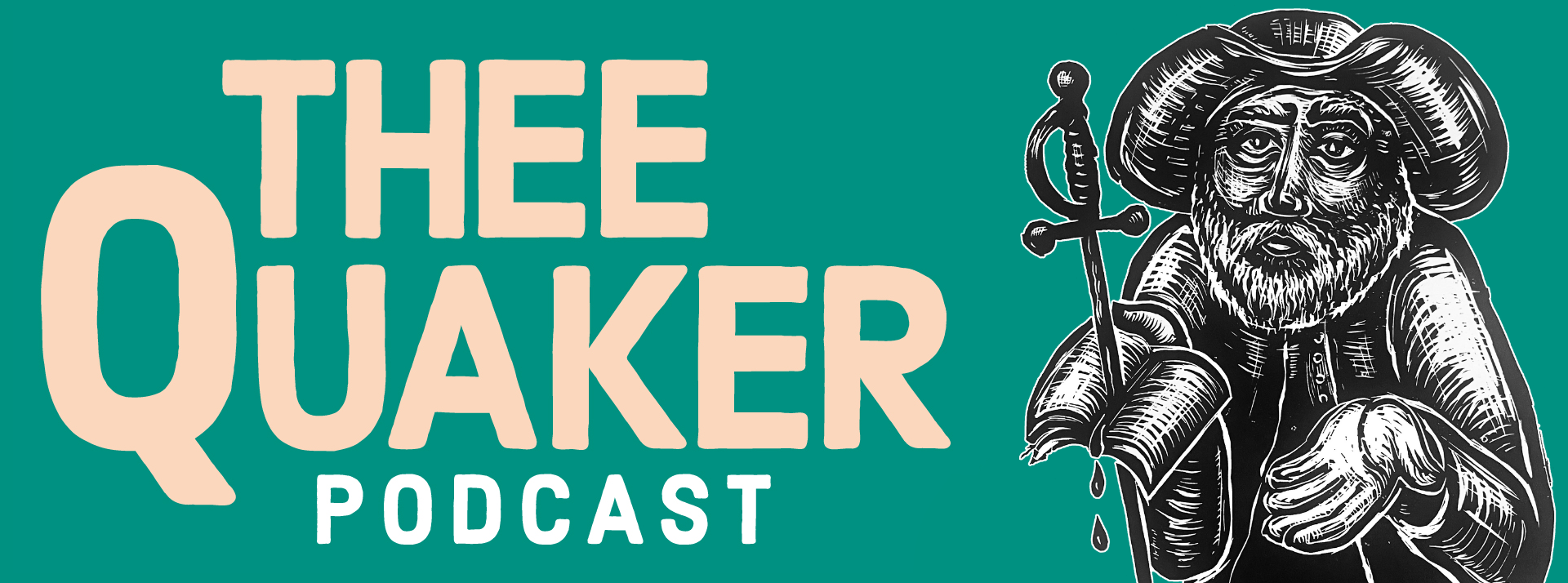

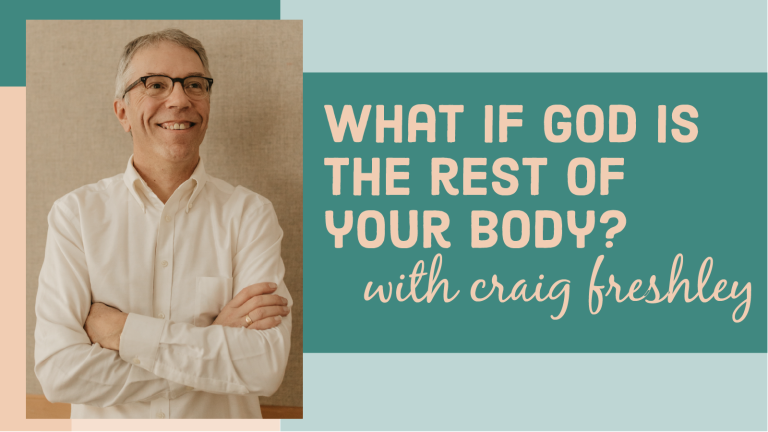
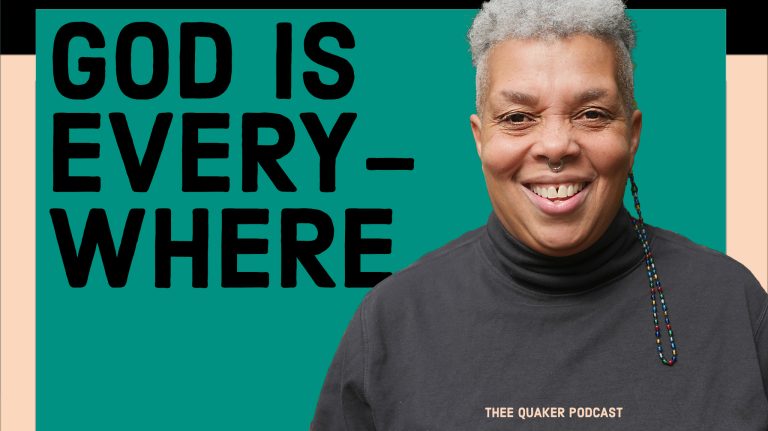
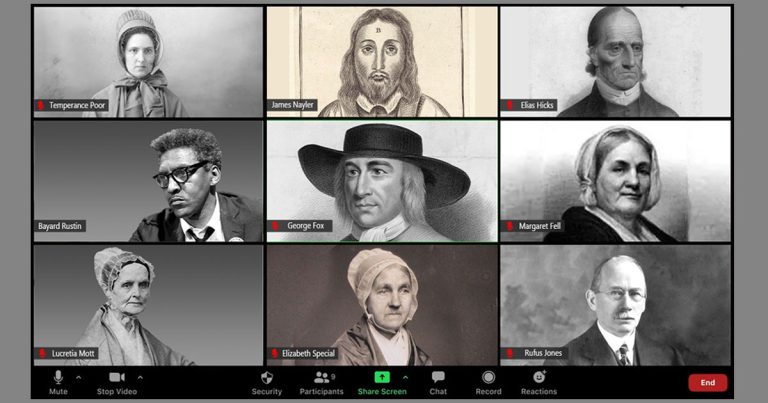
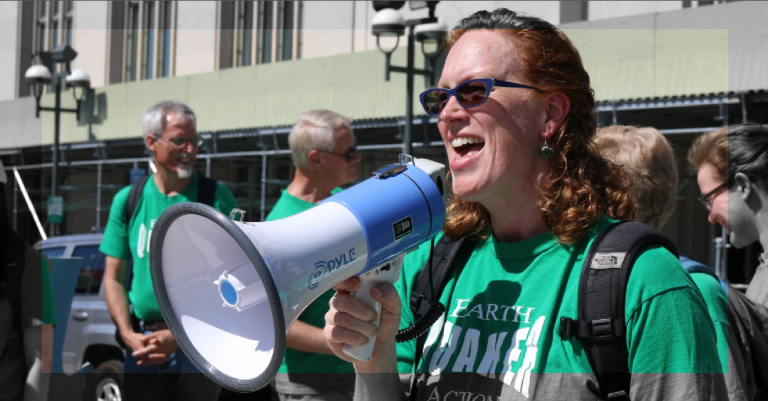
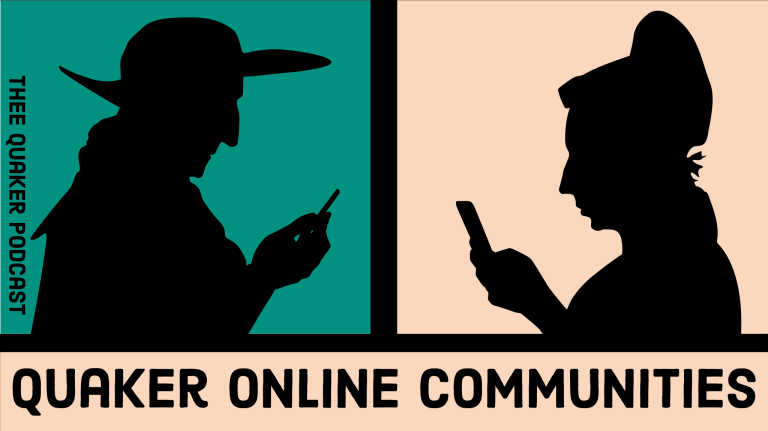
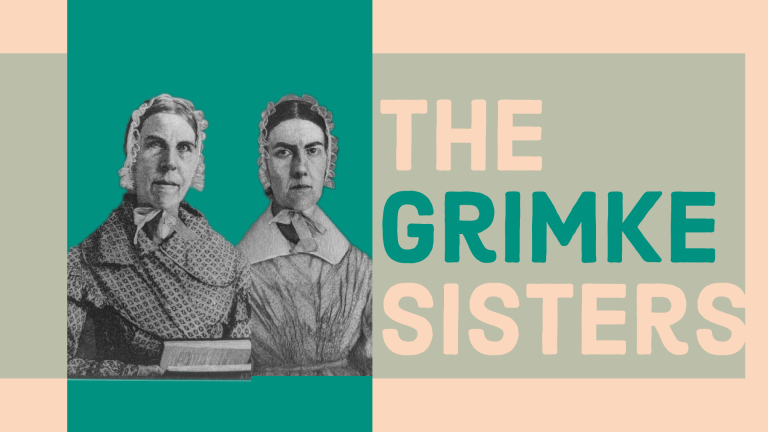
This is now my favorite episode. Yes I have been grading each episode. As with everything in life we take what we need to move on and discard the rest.
I am an attendee but this episode pushed me to write ✍️ for membership.
Thank you 😊.
That’s great to hear. Hopefully that means it’s an A+. Thanks for listening!
I must listen to this episode again because it was so rich. A big takeaway from my first listen was from the man who spoke about how what we agree on and experience is what’s shared even though the culturally familiar language we use may differ. That really spoke to me deeply as someone who is relatively new (began attending shortly before the pandemic) to Quakerism. I have really appreciated the respectful plurarality within my own meeting and struggled to feel a sense of unity with the more evangelical/overtly Christian expressions of Quakerism. The idea that early Quakers expressed their experience in spiritual terms they were most familiar but that we are open to continuing revelation which allows for new language with made it al make much more sense and helps me take a more open view.
I’m thankful it resonated with you.
Very interesting. I’m not a Quaker but went to a Quaker school and as a result have always respected Quakers. When I think of them I think of people who believe all humans are equal, there should be peace in the world, and that it is an honour and pleasure to help the community in general. Caring people.
A memorable episode that I planned to come back to and already only two weeks later, I found myself recalling it after reading this evening a quote printed in the August 22, 1959 edition of the [then] weekly Friends Journal:
“Friends have no written creed; they often differ in the way in which they would express their faith; they do not pretend to know all the answers. They are aware of inconsistencies in the beliefs they hold, they cannot explain all the pain and cruelty and suffering in the world. They would not all give the same reply. if they were asked about miracles or the resurrection. But they have found by experience that Christ’s teaching is relevant .to the problems of our modern industrial society, that it does provide guidance for daily action. More than that, while they realize, with humility, how little they understand of space and matter, of time and eternity, of life .and death, of suffering and sin, of love and redemption, yet they know, also by experience, that life is not all seeking, not all doubt. Humble seekers after truth and goodness find God in unexpected ways and places, and those who. Have found can never again be satisfied with a life that ignores Him” .- KATHLEEN LONSDALE, Science and Quakerism, a leaflet published by Friends General Conference and Representative Meeting, Philadelphia Yearly Meeting
All of the FJ archives are freely accessible through the publication’s website. I’m slowly working my way through each issue, coupled with a chronological reading tour of the Pendle Hill pamphlets. I’m finding this historical journey is greatly enriching my understanding and appreciation of the Quakerism I’m encountering today. Thank you for producing podcasts of such quality that I suspect, in one form or another, some future seekers will be revisiting many, many decades from now.
Thank you for sharing that quote, Mark. I do hope the episodes will be evergreen for future seekers.
My concern about this episode is that Evangelical Friends were mentioned, but we didn’t actually hear from any. Their views, or what others have experienced of their views, were described but not represented. I don’t recall any mention of Conservative Friends, or Friends from the pastoral tradition, unless reference to evangelicals was supposed to encompass pastoral Friends as well. In terms of accuracy I would hope that that wasn’t the case. Each person interviewed provided responses that were consistent with Liberal Quakerism, but with which many others would disagree, myself among them. I’m unsure why a more diverse set of voices wasn’t represented in terms of those interviewed. Perhaps it was due to a lack of proximity/access to Friends from other theological backgrounds? If so, I would advocate in future that others be sought out who might answer questions about the beliefs of Quakers in ways other than what we heard here. My concern is that someone unfamiliar with Quakerism would come away from this episode with the impression that the Religious Society of Friends isn’t simply diverse in its beliefs, but is instead largely theologically incoherent in its beliefs. Discussing the existence of a diversity of viewpoints within the Society is laudable, but representing more of them would have given this episode a balance that I found lacking.